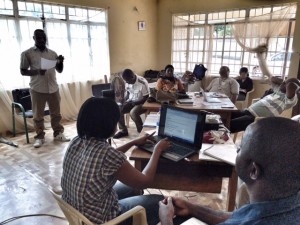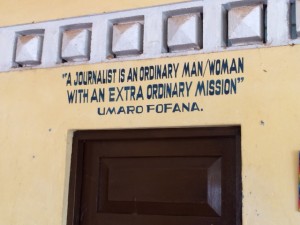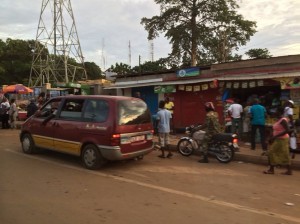Stanley Banagura Jr. addresses journalists about repealing the criminal libel law.
The question was a fair one.
“What do you see as the future for journalism in Sierra Leone, maybe in the next five years?” radio journalist Matthew Kanu asked as I mopped the sweat from my brow for the umpteenth time that oppressively hot day.
I gave a positive answer to the thousands of people listening in on the five Radio Maria Catholic stations carrying my live interview.
The real question is what will Matthew and other journalists make of their opportunities in this time? It doesn’t matter what I think, if I’m right or wrong. All that matters is what people here, journalists up front, work to accomplish in a country desperately seeking solutions to many obstacles holding back a free press and free speech.
For starters, imagine a law that can not only hold a journalist criminally responsible for an allegedly libelous statement but also hold citizens to those expectations for simply reading or listening to those words. A paper calls the president a rat. The reporter is jailed for libeling him, detained 10 days. You think, too bad for the journalist. That same law applies to any citizen who writes or speaks ill of another. And, if you are one of the many people who are seen reading that rat reference, then you could be arrested and charged with sedition, extending the defamation into the public sphere.
Sound absurd?
The people here think so as well. In fact, the United Nations and the U.S. government have told the Sierra Leone officials time and again that this isn’t an acceptable law in a democracy. They don’t seem to care.
“What if every paper said the same thing and then a large crowd marched to the jail, a thousand strong, and demanded to be jailed for reading something like that?” I asked, trying to make my point for solidarity.
Without a hesitation the response from many in the room was, “They would find space in the jail for a thousand people to prove their point.”
While here I’ve been diplomatic at times but outspoken often. I don’t think journalists should be going to jail for such nonsense. I don’t think any governance that claims to be a democracy should entertain such a law, let alone use it. I don’t think high-ranking government officials or mining companies should own newspapers. I think 63 newspapers in this tiny country are too many. I think too many journalists lack ethical standards, taking “brown envelopes” of money to write or not write certain stories. I think making up sources and facts in a paper and slanting every story for a political party is a terrible way to foster a responsible press. I think all of this and said so as often as I could when I held a microphone.
But it’s not up to me to right these issues. I can advise, and I did a lot of that this week, drawing on my experience in ethics, media law and media association management. I appealed to their ethics, which many have, and I reached them with reason. Matthew Kanu and his colleagues with the Sierra Leone Association of Journalists are strong, principled people who want a better country with a responsible press and the choke of an oppressive government away from its neck.
Five years can be a long time under these conditions. My hope is that Matthew and many like him can make a difference. I know they will try. And, for my continuing part, I will support them any way I can.


